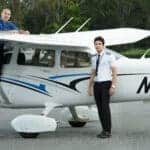DGCA Medical Exams: The #1 Ultimate Guide for Pilots in India

DGCA Medical Exams play a crucial role in determining the eligibility of pilots in India. These medical assessments ensure that aspiring and current pilots meet the required physical and mental fitness standards to operate aircraft safely.
Maintaining good health is not just a personal requirement but a regulatory mandate under DGCA guidelines. These exams are designed to evaluate vision, hearing, cardiovascular health, and other essential medical parameters. Understanding the DGCA medical classifications and the certification process is vital for pilots at every stage of their careers.
Types of DGCA Medical Exams
The DGCA medical exams are classified into three categories based on the type of aviation role and license. Each category has specific medical requirements to ensure pilots and aviation personnel are fit to operate safely.
Class 1 Medical Exam (For Commercial Pilots – CPL and ATPL)
Class 1 medical certification is the most comprehensive and stringent, required for pilots operating commercial aircraft. Since these pilots are responsible for passengers and large aircraft operations, their medical fitness is evaluated in detail.
The examination includes cardiovascular tests such as an Electrocardiogram (ECG) to monitor heart health and detect any irregularities. A thorough neurological assessment ensures that the pilot has no cognitive or motor function issues that could impair flying ability. The vision test requires 6/6 visual acuity in each eye, with or without correction, and no severe color blindness, as distinguishing cockpit indicators and runway lights is critical.
Audiometric tests assess hearing clarity, as pilots must be able to communicate effectively with air traffic control. Additionally, pilots undergo psychological screening to assess mental resilience, as aviation is a high-stress profession requiring quick decision-making under pressure.
Validity and Renewal
- For pilots under 40, the Class 1 medical exam is valid for one year.
- For those 40 and above, it must be renewed every six months.
Initial Class 1 medicals must be conducted at DGCA-approved centers like the Institute of Aerospace Medicine (IAM), Bengaluru, and the Air Force Medical Establishment (AFME), New Delhi before progressing to a CPL.
Class 2 Medical Exam (For Private and Student Pilots – PPL and SPL)
Aspiring pilots beginning their training for a Private Pilot License (PPL) or Student Pilot License (SPL) must first pass a Class 2 medical exam. While not as extensive as Class 1, this evaluation ensures that student pilots meet the basic health requirements before solo flights.
The assessment includes:
- A general physical examination to check for overall fitness.
- Vision tests to confirm sufficient eyesight for safe flying, with correction allowed.
- Hearing assessment to ensure clear communication with air traffic controllers.
- Blood pressure checks to rule out hypertension that could impact flight performance.
Unlike Class 1, Class 2 exams are available at multiple DGCA-approved examiners across India, making them more accessible. Pilots who pass this stage can then apply for further training.
Validity and Renewal
- If under 40, the Class 2 medical certificate is valid for two years.
- For pilots aged 40 and above, renewal is required annually.
Class 3 Medical Exam (For Air Traffic Controllers and Aviation Personnel)
Apart from pilots, air traffic controllers (ATCs) are also required to meet medical fitness standards under DGCA regulations. Since controllers play a crucial role in maintaining safe flight operations, they must undergo routine medical checks to ensure alertness and decision-making ability.
This examination includes:
- Vision and color perception tests to read radar screens accurately.
- Cardiovascular health screening to detect risks such as high blood pressure.
- Neurological evaluations to ensure cognitive sharpness.
- Stress and mental health assessments to confirm resilience under high-pressure conditions.
Class 3 medical certificates must be renewed periodically to maintain operational eligibility.
Each category of DGCA medical exams is designed to ensure that aviation professionals meet strict physical and mental fitness standards. Aspiring commercial pilots must first clear a Class 2 medical exam before progressing to Class 1 certification, while air traffic controllers follow a separate Class 3 medical assessment pathway.
By understanding these classifications, pilots can plan their training timeline effectively and ensure compliance with DGCA regulations from the start.
Step-by-Step Process of DGCA Medical Exams
The DGCA Medical Exams follow a structured process to assess a pilot’s physical and mental fitness for flying. The first step is registering through the DGCA-approved system and booking an appointment with a certified medical examiner.
For pilots requiring a Class 1 medical certificate, the exams must be conducted at designated institutions such as the Institute of Aerospace Medicine (IAM) in Bengaluru or the Air Force Medical Establishment (AFME) in New Delhi.
Private pilots and student pilots can undergo Class 2 DGCA Medical Exams at approved centers across India. Since appointment slots are limited, early booking is recommended.
Registration and Appointment Booking
To appear for the DGCA Medical Exams, pilots must apply through the DGCA portal and choose a certified medical examination center. Required documents include a government-issued ID, past medical records (if applicable), and a completed self-declaration form detailing medical history. Once the appointment is scheduled, pilots must prepare for the upcoming tests.
Pre-Examination Preparation
Proper preparation is essential for accurate test results during DGCA Medical Exams. Pilots should stay well-hydrated, avoid caffeine and nicotine, and get sufficient rest before the exam. Strenuous activities should be avoided a day before, as they may affect blood pressure and cardiovascular readings.
Medical Examination Process
On the examination day, pilots undergo a comprehensive health evaluation to determine their fitness for flying. The DGCA Medical Exams include vision and hearing assessments, cardiovascular screening, neurological evaluations, and general health check-ups.
If any irregularities are detected, additional tests may be required before certification is granted. Once completed, the results are submitted to DGCA for review, and if approved, the pilot receives a DGCA Medical Certificate, a mandatory requirement for obtaining or renewing a pilot’s license.
Key Medical Tests Conducted During DGCA Medical Exams
The DGCA Medical Exams include several tests to assess a pilot’s physical and mental capabilities, ensuring compliance with aviation safety standards. These evaluations cover vision, hearing, cardiovascular health, neurological functions, and overall fitness.
Vision and Eye Test
Pilots must meet strict visual standards to pass DGCA Medical Exams. A minimum of 6/6 vision in each eye, with or without corrective lenses, is required. The test also evaluates color vision to ensure pilots can accurately interpret aviation signals and cockpit displays.
Depth perception is another critical factor assessed, as it plays a key role in judging distances during takeoff, landing, and in-flight maneuvers.
Hearing and ENT Examination
Clear communication between pilots and air traffic controllers is vital, making the hearing test a crucial component of the DGCA Medical Exams. Audiometry tests measure a pilot’s ability to hear different frequencies, while an ENT (ear, nose, and throat) examination checks for infections or conditions that may affect balance or ear equalization at high altitudes.
Cardiovascular and Neurological Assessment
Heart health is a significant factor in DGCA Medical Exams, as flying involves dealing with varying altitudes and stressful situations. Pilots undergo an electrocardiogram (ECG) to monitor heart function and detect potential abnormalities.
Blood pressure levels must be within the acceptable range, as uncontrolled hypertension may disqualify a candidate. Neurological assessments evaluate reflexes, coordination, and cognitive function, ensuring pilots can react swiftly and make sound decisions during flights.
General Health and Blood Tests
A full-body check-up is an essential part of the DGCA Medical Exams. Blood tests help detect conditions such as anemia or infections, while liver and kidney function tests assess the body’s metabolic efficiency. Diabetes screening is conducted to ensure stable blood sugar levels, as fluctuations could affect a pilot’s performance. If any medical conditions are identified, further evaluation may be necessary before certification is granted.
Common Medical Conditions That Can Affect Pilot Eligibility
The DGCA Medical Exams have strict health criteria that pilots must meet to ensure aviation safety. Certain medical conditions can lead to temporary or permanent disqualification, depending on their severity and impact on flight performance.
Conditions such as uncontrolled hypertension, diabetes, epilepsy, and heart disease may result in ineligibility unless properly managed. Temporary conditions, such as minor surgeries or infections, may require a pilot to undergo additional medical evaluations before regaining certification.
Pilots with manageable conditions must demonstrate stable health to pass the DGCA Medical Exams. Lifestyle adjustments, including proper diet, regular exercise, and medical supervision, can improve eligibility. For conditions like hypertension or diabetes, medication compliance and medical records showing stable control are necessary for approval. Mental health is also a crucial factor, and pilots must maintain cognitive stability to meet regulatory standards.
If a pilot is disqualified due to medical reasons, there is an appeal process to request re-evaluation. The DGCA allows pilots to submit additional medical reports from specialists, along with supporting documentation, to challenge a medical ruling.
In some cases, a special medical board reviews the pilot’s condition to determine if they can safely return to flying. If successful, the pilot may be granted conditional approval or undergo periodic health monitoring to maintain certification.
DGCA Medical Certificates are not permanent and must be renewed periodically to ensure pilots remain fit for flying. The validity period depends on the type of medical certificate and the pilot’s age.
For commercial pilots (CPL and ATPL holders), the Class 1 DGCA Medical Certificate is valid for one year if the pilot is under 40 and six months for those above 40. Private pilots (PPL holders) and student pilots (SPL holders) must renew their Class 2 DGCA Medical Certificate every two years. Air traffic controllers and aviation personnel holding a Class 3 Medical Certificate also require periodic renewals based on DGCA regulations.
Pilots must initiate the renewal process before their medical certificate expires to avoid disruptions in flight operations. The renewal procedure involves scheduling an appointment at a DGCA-approved medical facility, undergoing the required medical tests, and submitting updated health records. Any significant health changes since the last examination must be reported, and additional tests may be required.
If a DGCA Medical Certificate expires, the pilot is prohibited from operating an aircraft until the certification is reinstated. Lapses in renewal may require additional medical assessments, and in some cases, a fresh Class 1 or Class 2 medical evaluation. To prevent disruptions, pilots should track their renewal dates and book medical exams well in advance.
Cost and Fees for DGCA Medical Exams
The cost of DGCA Medical Exams varies based on the type of certification required. The Class 1 Medical Exam, which is mandatory for commercial pilots, is typically more expensive than the Class 2 Medical Exam, required for private pilots and student pilots. The examination fees include charges for standard medical assessments such as vision, hearing, cardiovascular, and neurological tests.
In some cases, pilots may be required to undergo additional medical evaluations beyond the standard tests. These can include advanced cardiovascular screenings like ECG or stress tests, MRI scans for neurological concerns, or specialized ophthalmology tests for vision-related issues. The costs for these specialized tests can add significantly to the total expense of the medical examination.
While DGCA does not offer direct financial assistance for medical exams, some aviation training institutions and pilot sponsorship programs may cover medical expenses as part of their funding. Additionally, certain private insurance providers offer policies that cover medical expenses for professional pilots. Pilots should explore available financial aid options to reduce out-of-pocket costs for their medical examinations.
How to Prepare for DGCA Medical Exams
Proper preparation is essential to ensure a smooth DGCA Medical Exam process and avoid unnecessary delays. Pilots should maintain a healthy lifestyle, follow medical guidelines, and be aware of DGCA’s medical requirements before scheduling their examination.
Pilots should ensure they are well-rested before the examination and avoid consuming alcohol or excessive caffeine 24 hours before the test. Staying hydrated and following a balanced diet can help maintain optimal blood pressure and cardiovascular health. Those with existing medical conditions should have updated reports from their healthcare providers to present during the examination.
Maintaining physical fitness is crucial for passing DGCA Medical Exams. Regular exercise, a nutritious diet, and avoiding smoking or excessive alcohol consumption can significantly improve overall health. Weight management is also important, as obesity can lead to disqualifying conditions such as hypertension and diabetes.
Mental health is a key factor in pilot medical fitness. Pilots should practice stress management techniques, such as meditation, mindfulness, or breathing exercises, to stay calm and focused during the examination. Those with a history of mental health conditions should have proper documentation from psychiatrists or psychologists to ensure they meet DGCA’s mental health criteria.
Conclusion
DGCA Medical Exams play a crucial role in ensuring that pilots meet the necessary health and fitness standards for safe flight operations. Throughout this guide, we have explored the different classes of medical exams, eligibility criteria, required tests, common medical conditions, and renewal procedures. Understanding the process and maintaining good health can help pilots navigate the medical certification smoothly and avoid unnecessary setbacks.
Regular medical checkups are essential for pilots who wish to maintain their flying privileges and pursue long-term careers in aviation. Staying proactive about health, following medical guidelines, and preparing adequately for examinations can significantly improve the chances of passing the DGCA medical assessment without complications.
For aspiring pilots in India, maintaining fitness should be a priority. A well-balanced lifestyle, proper stress management, and adherence to DGCA medical requirements can ensure a smooth journey toward achieving and sustaining a successful aviation career. With the right preparation and commitment to health, pilots can confidently meet medical standards and continue to soar in their careers.
Contact the Florida Flyers Flight Academy India Team today at +91 (0) 1171 816622 to learn more about the Private Pilot Ground School Course.



Table of Contents






